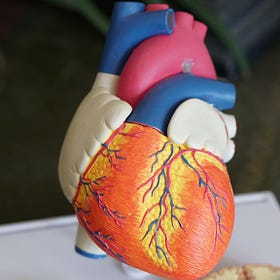Is Aspirin Beneficial For Preventing Heart Attacks?
We'd first need to understand what it does in our body.
Aspirin is a drug that is commonly prescribed for heart disease patients.
However, it is mentioned that the consumption of aspirin does have its drawbacks, such as:
Bleeding risks for adults in their 60s and up who haven’t had a heart attack or stroke outweigh any potential benefits from aspirin.
But the question that remains is: was aspirin even intended to avoid heart attacks or strokes?
Well, obviously not.
It was intended as a blood thinner - because people who do have atherosclerotic plaques built up in their arteries tend to be chronically inflamed.
And inflammation promotes clotting.
Hence, a plaque rupture would lead to an accelerated rate of clot formation, and this clot can then cause a stroke, heart attack or deep vein thrombosis, depending on where the clot lodges and blocks blood flow.
Therefore we have anti-clotting drugs such as aspirin or warfarin to prevent clotting from occurring too rapidly, but that’s the main thing that they do in the grand scheme of things for heart disease issues.
Regulating the inflammatory response isn’t in their biochemical scope of work - that work comes from the cells in the immune system.
And this inflammatory response can also trigger the live macrophage cells entrapped within the atherosclerotic plaque to produce more matrix metalloproteinase (MMP) enzymes to eat away at the cap of collagen that entraps them all within the plaque until the plaque eventually ruptures.
Aspirin, for all its worth, only reduces the probability of a clot forming.
And when the cells that are producing these MMPs are macrophage cells, which are also responsible for being the defenders that the immune system calls upon when viruses or bacteria have broken through the initial skin or mucous membrane barriers.
How well do you think the immune system of a heart disease patient will be able to respond to a massive bacterial or viral infection?
We saw that happen in the early days of the COVID-19 pandemic - many of them were at higher risk of developing cytokine storms, which weren’t exactly pleasant experiences at all.
It’s much more likely for them to get into a cytokine storm because some of their macrophage defenders are entrapped within those plaques and are unable to carry out their normal defensive duties, no?
Long story short, aspirin was never meant to be used to avoid heart attacks completely. It’s a partial strategy that SOLELY focuses on reducing the probability of clotting, without influencing the biochemical activities of cells that are involved in other facets of the anatomy behind a heart attack.
It requires a more multi-pronged and strategic approach to support a healthy heart, especially when heart disease is linked with inflammation and a dysregulated immune system.
Starting it off (and consistently maintaining) good nutrition in our diet can be highly beneficial!
Do feel free to check out
10 Nutrients That Support A Healthy Heart
Supporting cardiovascular health is not an easy thing to do. We eat food. We exercise. We get stressed by work. We sleep. All these actions do contribute to the overall state of our immune system. As a result, if we ever do encounter situations such as high blood cholesterol in our middle age years (or later), we freeze. We don’t really know what to do. …
to see how our diet can support healthy heart functions.
Also, do feel free to share this article and hit the “subscribe” button to get more updates about the science concepts in nutrition and health, all deconstructed nicely for your convenient perusal!
The Role That A Clot Plays In A Heart Attack
Our blood is a very unique fluid. It doesn’t just contain water. It contains a whole load of other dissolved substances such as proteins, electrolytes and vitamins, as well as other insoluble components such as the red blood cells. As such, our blood can do a lot of things that other fluids can’t really do — and that is chiefly because of what else is in…
Now, Seriously, What's So Tricky About Cholesterol?
This article is the final part of a 3 part miniseries. The first 2 parts can be found at: Medical science has been talking about cholesterol and its links to heart disease for years. People who are at risk of heart failure are invariably prescribed medicines such as
Inflammation — Like It Or Not, It’s Here To Stay.
It would suffice to say that the word “inflammation” is causing quite a stir these days. When we’re injured, for instance, the site of injury is experiencing acute inflammation, and that contributes to unpleasant sensations of pain and swelling that we can feel








